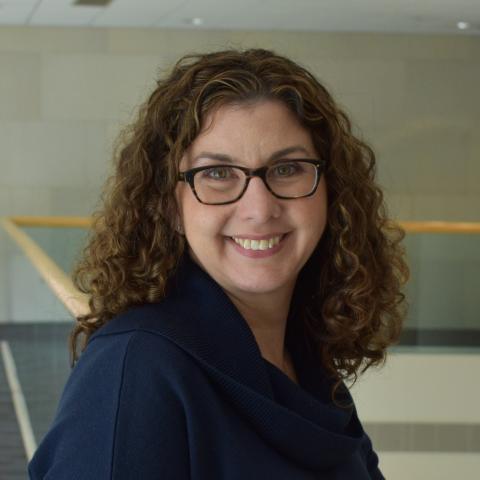As the new Associate Director for Community Outreach and Engagement, Erika Trapl, PhD, strives to facilitate a bidirectional connection between Cancer Center research faculty and catchment-area community partners. The catchment area will inform research projects and, in turn, research will be used to inform and impact local communities. Trapl has used this reciprocal cycle for nearly two decades.
Trapl has spent her academic career partnering with Cleveland communities on health-related issues such as tobacco use and dietary behaviors. She is a community-engaged researcher devoted to identifying opportunities to improve health and health outcomes in local communities – especially in areas impacted by systemic inequalities.
Trapl is a homegrown leader, having spent her entire academic career at Case Western Reserve University. She did not find epidemiology and public health until the tail-end of her undergraduate experience and began working on diet and physical activity intervention for young girls. She discovered a passion for prevention and how to get to a disease before it started. While partnering with schools on projects, her eyes opened to the value of working collectively with community partners. “Behavioral interventions are conducted under strict criteria, and they look different in the real world,“ says Trapl. “It brought to my mind the value of thinking about solutions implemented in the community context as opposed to solutions in a perfect setting with paid participants.“
In 2010, Trapl joined what is now known as the Department of Population Quantitative Health Sciences and applied a community-engaged approach to examine tobacco use. Since then, she has become a local leader for tobacco-based research, stemming from pre-doctoral experience with the Ohio Tobacco Prevention Foundation. She worked as an evaluator for the community grants program, collaborating with health departments and organizations across Ohio that were implementing evidence-based tobacco control. “It gave me a much broader perspective to what tobacco control was being implemented, but also opportunities to dig into the issues we weren’t talking about, such as the cigar products.“
The Little Cigar Working Group was enlightening in unexpected ways. Trapl’s team discovered they were missing nuances associated with these products. “As researchers, we were thinking about long-term risks and health outcomes. We realized users are thinking about social aspects and connectedness of that relaxation and stress management and coping and to get through their day,“ says Trapl. “Our success wasn't about understanding the product. It was challenging ourselves to understand the perspective of users. We made sense of it from the context of the community as opposed from the context of the academic researcher.“
Trapl set roots at CWRU and the Case Comprehensive Cancer Center because she is encouraged by her colleagues' inquisitiveness and collaborative nature. She also sees the opportunity to have a significant impact on our local region. “If we can take our commitment to collaboration and continue to shift beyond the walls of our institution, I think we will realize our opportunity for local impact is phenomenal. And we will find that impact is just as powerful as our national and international reputation.“
This story was featured in our 2020 Annual Report. Click here to read the full report.


